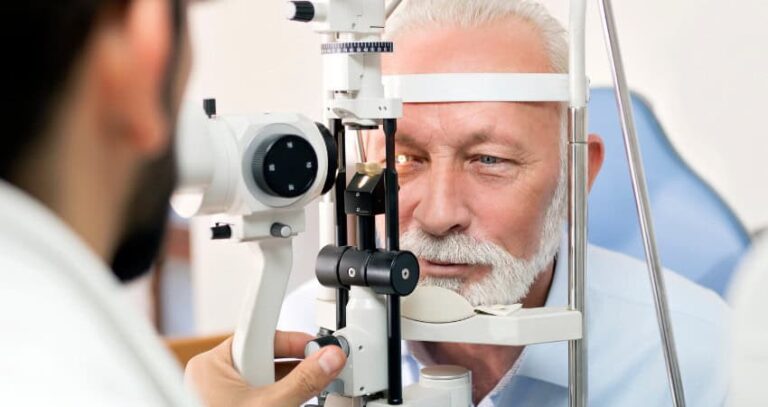Glaucoma is one of the leading causes of irreversible blindness, and many patients don’t realize they’re at risk until it’s too late. If you have a parent, sibling, or grandparent who has been diagnosed, you may wonder: Is glaucoma hereditary? The short answer is yes. Family history plays a significant role in determining your risk, but early detection can make all the difference.
At Florida Eye Specialists, we’re here to explain how genetics influence your risk of developing glaucoma, the importance of regular screenings, and what treatment options are available to help preserve your vision.
What Is Glaucoma?
Glaucoma is a group of diseases that damage the optic nerve. Eye pressure is often elevated, but damage can occur even at normal pressures. This damage typically occurs gradually and without warning, making early diagnosis critical.
There are several types of glaucoma, and each requires a tailored approach to treatment and monitoring. These include:
Primary Open-Angle Glaucoma
The most common form. It develops slowly and often without noticeable symptoms.
Angle-Closure Glaucoma
Occurs when the drainage angle in the eye becomes blocked. This type can develop suddenly and cause a painful spike in eye pressure. These sudden angle-closure symptoms like severe eye pain, headache, halos, nausea, and blurred vision are an emergency. Seek same-day care.
Normal-Tension Glaucoma
Even when eye pressure remains within normal limits, optic nerve damage may still occur.
Congenital or Pediatric Glaucoma
A rare form present at birth or developing in early childhood due to abnormal eye development.
Is Glaucoma Hereditary?
Research has shown that genetics play a significant role in glaucoma. According to the Glaucoma Research Foundation, having a first-degree relative with glaucoma can increase your risk by up to nine times compared to the general population.
However, the way glaucoma is inherited isn’t always straightforward. Some rare forms of glaucoma follow a direct genetic pattern, but most adult-onset cases are considered complex. That means several genes may be involved, along with other risk factors such as age, race, and overall eye health.
Several gene variants have been linked to glaucoma, including MYOC, OPTN, and TBK1, though genetic testing is not commonly used for routine screening.
If glaucoma runs in your family, it’s important to let your eye doctor know. This allows them to closely monitor your eye pressure, optic nerve health, and visual fields over time.
What Glaucoma Symptoms Should I Watch For?
Most types of glaucoma progress without pain or early symptoms. Many patients do not realize anything is wrong until their vision has already been damaged. That’s why regular screenings are the best way to detect glaucoma early. When glaucoma symptoms do occur, they may include:
- Loss of peripheral or side vision
- Tunnel vision
- Blurred vision
- Halos around lights
- Eye pain or redness (particularly in angle-closure glaucoma)
Because symptoms can be so subtle, many people with a family history of glaucoma may feel fine while the disease quietly advances. Don’t wait for symptoms – schedule regular exams.
Why is Early Detection So Important?
Routine eye exams are the most effective way to detect glaucoma in its earliest stages. During a comprehensive eye exam, your ophthalmologist will check your intraocular pressure, examine the optic nerve, and perform visual field testing if needed.
If you have a family history of glaucoma, your doctor may recommend more frequent monitoring, even if your vision seems normal. Early detection allows for timely treatment, helping prevent or slow down permanent vision loss.
What Glaucoma Treatment Options Are Available?
While glaucoma cannot be cured, it can be managed effectively with the right treatment plan. The goal of treatment is to lower eye pressure and protect the optic nerve from further damage. Common treatment options include:
- Prescription eye drops to reduce fluid production or improve drainage
- Laser procedures, such as trabeculoplasty, to enhance fluid outflow
- Minimally invasive glaucoma surgery (MIGS) or traditional surgery to lower pressure in more advanced cases
Every patient is different. Your doctor will recommend the best treatment based on the type and severity of your condition.
Take Steps to Protect Your Vision with Florida Eye Specialists
If someone in your family has been diagnosed with glaucoma, your risk may be higher. But with regular eye exams and proactive care, vision loss can often be prevented.
Talk to your doctor about your family history, and don’t delay your next appointment. Schedule a comprehensive eye exam with Florida Eye Specialists today to protect your vision.
